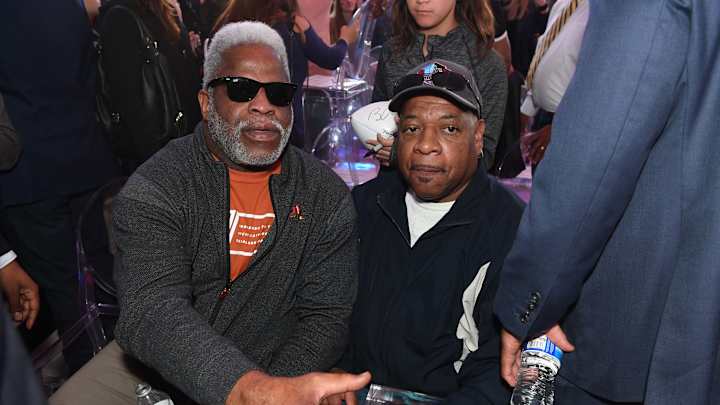Texas Football: Earl Campbell ranked No. 7 in ESPN’s 150 Greatest Players

AUSTIN, Texas – Texas Football legend Earl Campbell was named the seventh-best player in college football history by ESPN on Monday night. Campbell is the fifth, and highest ranked, Longhorn named among ESPN’s top 150 college football players of all time. That list also features Tommy Nobis (No. 54), Ricky Williams (No. 57), Bobby Layne (No. 75) and Vince Young (No 81), who were all unveiled last week.
Campbell, the famed “Tyler Rose,” holds a special place in The University of Texas and state of Texas’ football history. As a senior at UT in 1977, Campbell became the first Longhorn to win the Heisman Trophy after he rushed for 1,744 yards – a Southwest Conference record that stood for 16 years – and 19 touchdowns. He led the nation in rushing and scoring, and posted a pair of 200-yard games on the road against Texas A&M (222 yards) and SMU (213 yards). Campbell also set a Texas record for 100-yard rushing games that season (10).
Campbell was an instant success at UT, starting at fullback in the Longhorns’ “Wishbone” attack. He rushed for 928 yards and six touchdowns as a freshman in 1974, claiming the first of his three career consensus All-SWC honors.
As a sophomore, Campbell ran for 1,118 yards and 13 touchdowns, earning the first of this two career consensus first-team All-America honors. He helped lead the Longhorns to a 10-2 record that year and was named the Offensive Player of the Game in the Longhorns’ 38-21 win against Colorado in the Bluebonnet Bowl. UT finished the year ranked No. 6 in the final Associated Press poll.
Campbell’s junior season was hampered by injury, as he missed four games with a pulled hamstring. He returned to form in his senior season however, and guided the Longhorns to a 6-0 start. The Horns claimed the No. 1 spot in the AP Poll at the season’s halfway mark, and held that ranking throughout the regular season. UT closed out the regular season with an 11-0 record before falling to Notre Dame in the Cotton Bowl. Texas finished the 1977 season ranked No. 4 in the final AP poll.
Campbell finished his time at Texas with a then-UT record 4,443 rushing yards and 40 touchdowns. Only 1998 Heisman Trophy winner Ricky Williams (6,279 yards/72 TDs) and 2004 Doak Walker Award winner Cedric Benson (5,540 yards/64 TDs) have surpassed Campbell on the Texas rushing charts.
After a star-studded collegiate career, capped by a Heisman Trophy and his second consensus first-team All-America honor, Campbell went on to the National Football League. He was selected No. 1 overall by the Houston Oilers in the 1978 NFL Draft and quickly made a name for himself, much like he did on the Forty Acres.
As a rookie, Campbell claimed virtually every award possible, including Rookie of the Year, Offensive Player of the Year and MVP honors. He rushed for more than 100 yards on seven occasions in his first season of professional football, and won the league’s rushing crown with an impressive tally of 1,450 yards. Campbell led the league in rushing again in 1979 with 1,697 yards and garnered his second consecutive league MVP and Offensive Player of the Year award.
On Aug. 18, 1986, Campbell retired from the sport of football. He concluded his pro career with 9,407 rushing yards and 74 touchdowns to go along with 121 receptions for 806 yards in eight seasons. UT retired Campbell’s No. 20 jersey in ceremonies at the Longhorns’ game against Baylor on Nov. 24, 1979, and the Oilers retired his No. 34 in 1987.
Campbell was inducted into the Texas Hall of Honor in 1988, and in 1990, he became a member of the National Football Foundation College Football Hall of Fame. He received enshrinement in the Pro Football Hall of Fame in 1991 and was honored with the Doak Walker Legends Award in 2003.
